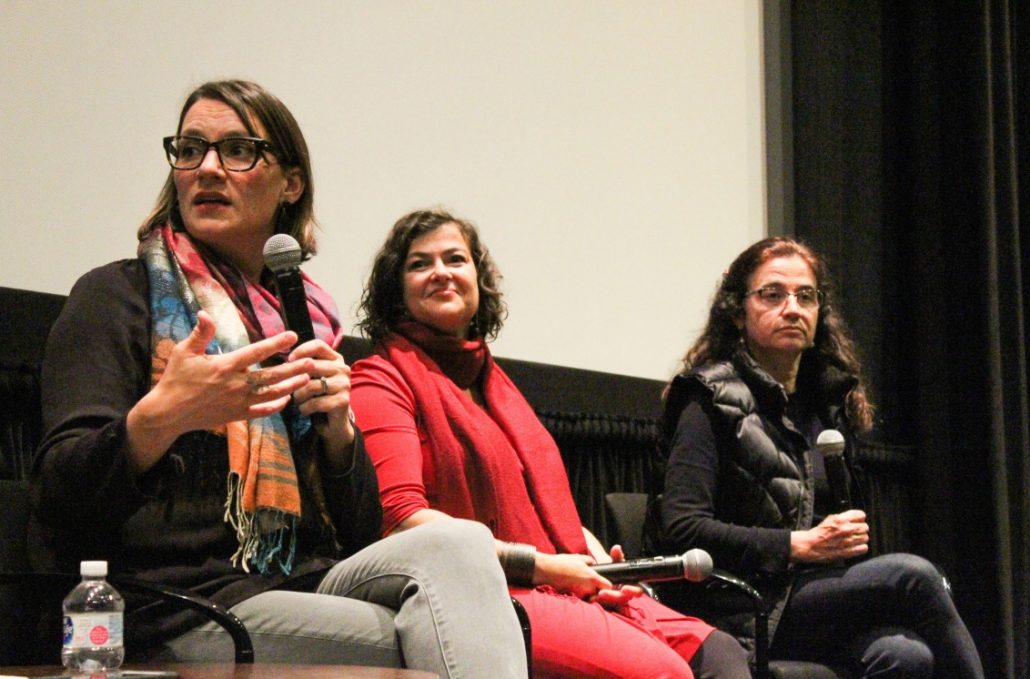‘Half the Picture’ director talks industry bias

In the age of #MeToo and amid a gender-based revolution within Hollywood, the documentary “Half the Picture” explores a pressing industry query: Why are there so few female filmmakers? As part of USC’s third-annual Diversity, Equity and Inclusion Week, the School of Cinematic Arts Council on Diversity & Inclusion and USC Levan Institute for Humanities and Ethics jointly presented a screening and discussion of the film Wednesday night.
Director Amy Adrion’s debut feature comprises heartfelt interviews with prominent female directors — Ava DuVernay, Catherine Hardwicke, Gina Prince-Bythewood and Lena Dunham, to name a few — about their early careers, creative visions and the industry’s sexism. The film is further strengthened by conversations with gender equality experts, journalists and professors, who contextualize the experiences women directors face within greater structures of systemic discrimination.
Following a showing of the 94-minute film, which was an official selection at Sundance and SXSW Film Festivals in 2018, Adrion took the stage for a Q&A session. She was joined by filmmaker Patricia Cardoso, one of the directors featured in the documentary; Melissa Goodman, the Director of Advocacy at the ACLU of Southern California and moderator Tara McPherson, Chair and Professor of Cinema and Media Studies at SCA.
McPherson kicked off the discussion by asking the panelists if they had encountered moments when they needed to resort to what “Transparent” creator Jill Soloway referred to in the documentary as “low-level bitchery” to accomplish their goals.
“I think you do find a moment where you’re kind of sick of trying to make everybody else happy and it’s time to just be and assert myself when I feel it’s needed,” Goodman said. “I find a relative sense of safety and privilege in doing that.”
The women also discussed how the reception of “Half the Picture” has been shaped by its timely release in a moment when stories about gender, sexual harassment and inequity are increasingly common.
“[The sexual assault conversation] was tricky stuff that I knew was important to include as part of women’s experiences in the business, but I didn’t want to make a film about that,” Adrion said. “This is a film celebrating these women, so I wanted to give [them] a proper place in the film where they remain the protagonists at the center of their own stories.”
The industry experiences shared by the women interviewed in the film, chief among them sexist hiring policies and the lack of accountability, resulted in an 18-month investigation into gender discrimination by the ACLU. McPherson inquired as to updates about the consequent, ongoing Equal Employment Opportunity Commission investigation — to which Goodman offered hopeful advice but no concrete answers.
“The reality is that … processes like this can take years,” Goodman said. “In the meantime, you have to just figure out what to do to keep the pressure on, to keep the conversation going.”
McPherson praised the film for its intersectional representation of Hollywood and its careful attention to specific obstacles faced by women directors. Each panelist then recounted a story of how female mentorship positively impacted her career.
Cardoso recalled crying out of anger upon receiving her first big break after 15 years in the entertainment business. She realized she had been internalizing her setbacks, which she now attributes to the prejudiced industry.
“I think the [issue of] internalization is huge,” Cardoso said. “[Like] many other female directors, I felt for forever that it was my fault, that I did something wrong to deserve [my failures]. How come I directed this incredible movie that got all these awards, but then I cannot get a job? … Then you see these statistics, like that women of color are .006 percent [of all directors] and I’m like, ‘Why? No wonder I can’t pay my rent!’”
The conversation was then opened to the audience, spurring personal anecdotes of sexual harassment in the film business, emotional thanks to Adrion for her touching film and questions about how young women can remain resilient in the face of the industry’s “heartbreaking” gender imbalance.
“At networks, at production companies, at studios, at agencies, at financiers — almost all the big shots in this world are men,” Adrion said. “It’s a fucked up system for women … We’re at a disadvantage because we tend to not be in those positions of power … [We just have to] try to be as tough as we can be to not let that stuff beat us down.”
The discussion ultimately ended on a hopeful note, with Goodman adding, “Keep doing it constantly, even when it seems like it’s not working.”

